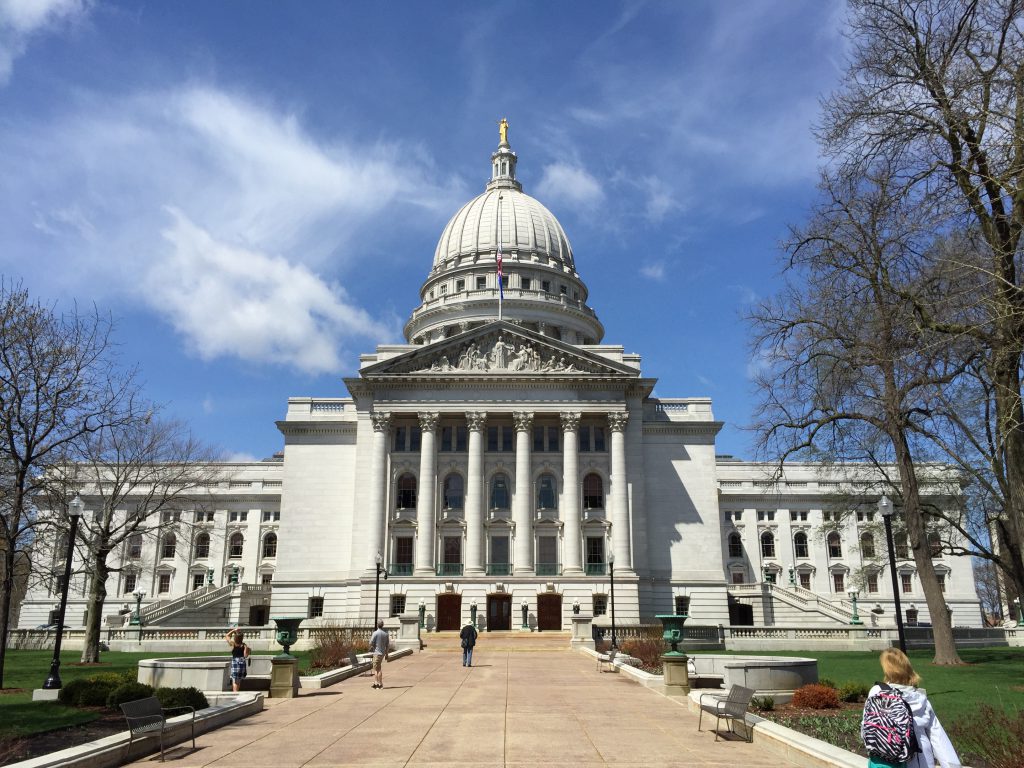Is Legislature Biased Against Working Class?
Just two of 132 members come from working class backgrounds, report finds.
Mike Sheridan started working at the General Motors Janesville assembly plant right after high school graduation. He became active in United Auto Workers Union and in his thirties went back to college to get his degree. Meanwhile he had been rising within the ranks of the union, becoming Local 95 president in 2002. Two years later he ran for and won a position as a state representative.
“My first day in the Legislature I looked around and thought, ‘oh my God, how did I get here?’ It’s all these men in suits and here I am, this working class guy.”
They defined legislators as working class if they currently or last worked in manual labor, service industry, clerical or labor union jobs. Nationally just 1.6% of state lawmakers met that definition, they found, compared with 50% of U.S. workers. Only about 2% of Democrats and 1% of Republicans serving as state lawmakers qualified as working class.
Wisconsin had exactly the same percentage: just 1% of Republican legislators and 2% of Democratic legislators are from working class occupations. Still that was better than in 10 states — Arkansas, Louisiana, Mississippi, North Carolina, Oregon, South Carolina, Tennessee, Texas, Utah and Virginia — that have no working-class state lawmakers, according to the study.
“In principle, anyone can run for office, but in practice, the people who are running and serving are overwhelmingly drawn from America’s professional classes.” Carnes noted. ”If you have an entire economic class of people that are not in the room when policy decisions are being made, that’s going to tilt the kind of problems politicians pay attention to.”
Ultimately Sheridan and Democrats passed an increase in the minimum wage in 2006, but there has been no state action since and the minimum is still just $7.25, set by the federal government in 2009.
Sheridan lost office in 2010. State Sen. Robert Wirch (D-Kenosha), another former factory worker and union activist who went to serve in the Legislature (since 1993), also points to the stagnant minimum wage as an example of how the working class lacks clout in the Legislature.
But the worst legislation was the Right to Work law passed in 2015, he contends. The law prohibits bargaining agreements between employers and unions which require employees who are not union members to contribute to the costs of union representation. “It was the greatest attack on labor unions in the history of Wisconsin,” Wirch says.
But the recent study on occupations is not just about union members or blue-collar workers, but considers a wide range of occupations that are unrepresented in state houses where college educated professionals and business people dominate.
Occasional surveys of legislators’ occupations have often noted the variety of jobs. Eight years ago the Center for Public Integrity analyzed 2015 disclosure reports from 6,933 lawmakers and listed lawmakers with such current or past jobs as horror movie producer, alligator hunter, hula dancer, reindeer herder, Uber driver and pro boxing and MMA fighting judge, “all occupations they say make them better legislators,” the report noted.
But for every onion broker or alligator hunter there are tons of white collar professionals who dominate in every state house. The last survey of the composition of the nation’s 50 state legislatures by Stateline and the National Conference of State Legislatures, done in 2015, found that the percentage of farmers had fallen from 9.7% in 1976 to just 4.6%.
“The survey found 29.5 percent of legislators are business owners, or are in accounting, insurance, real estate or other business fields. In all, 55 percent of state legislators nationwide work in business, are lawyers, or say lawmaking is their main profession.”
This means certain kinds of workers get more consideration for legislation. The Center for Public Integrity’s review of disclosure reports “found numerous examples of state lawmakers around the country who have introduced and supported legislation that directly and indirectly helped their own businesses, their employers or their personal finances.”
But it’s not easy to recruit working class people for office, Hintz notes, as they may not have the time and money it takes to run for political office. The massive increase in the cost of campaigns has made that all the harder.
All of which contributes to exactly the problem noted by this report. “I think there is a deafness within the Legislature,” Hintz says, “with the majority out of touch with what ordinary people face economically.”
If you think stories like this are important, become a member of Urban Milwaukee and help support real, independent journalism. Plus you get some cool added benefits.
Murphy's Law
-
National Media Discovers Mayor Johnson
 Jul 16th, 2024 by Bruce Murphy
Jul 16th, 2024 by Bruce Murphy
-
Milwaukee Arts Groups in Big Trouble
 Jul 10th, 2024 by Bruce Murphy
Jul 10th, 2024 by Bruce Murphy
-
The Plague of Rising Health Care Costs
 Jul 8th, 2024 by Bruce Murphy
Jul 8th, 2024 by Bruce Murphy























Interesting stuff….neither party has folk in the capitol that came from the “majority occupations” of the state. And so how can either legislate truly in the best interests of the majority if they come from biz, white collar or govt backgrounds?
The abysmal WI minimum wage level is a painful case in point. Imagine living on $15,080/year!! Whew….
Given the amount of time spent on a campaign, once a working person finishes a 40+ hour workweek, they have little time for that,, unlike professionals who have flexible time.